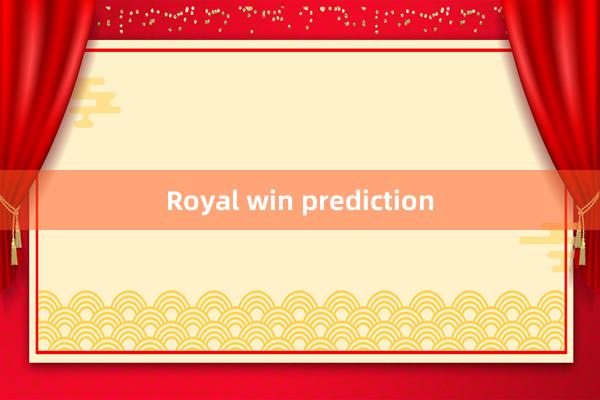
The Allure of Royal Win Prediction

In the grand tapestry of history, royals and rulers have often relied on predictions and forecasts to guide their decisions. "Royal win prediction" conjures images of powerful kings and queens, consulting wise sages, studying the stars, or even reading omens in pursuit of a favorable outcome. The idea of predicting the future—of having a glimpse into the outcome of events—has fascinated people across cultures, especially when the stakes involved power, wealth, and survival.
The phrase "royal win prediction" carries both mystique and gravitas, suggesting an ability to foresee outcomes of crucial battles, political maneuvers, and even personal ventures. From ancient civilizations to modern times, humanity has always held onto the desire to control destiny. But how exactly did royals of the past predict their wins? And what methods have evolved today? In this first part, we’ll explore the historical roots of win prediction and how it became an essential tool for rulers, while the second part will dive into the intriguing ways we still use these ideas today.
Ancient Beginnings: Oracles, Astrology, and Omens
Historically, the methods used by royals for win prediction were deeply rooted in religion and mysticism. Ancient Egyptians, for example, consulted priests who interpreted the will of gods, using oracles and sacred rituals to predict the outcomes of wars and the fates of pharaohs. The Greeks relied on the Oracle of Delphi, a powerful figure who gave ambiguous yet influential prophecies to those seeking guidance. By consulting these oracles, leaders hoped to gain divine favor and insight into their odds of success.

Astrology also played a pivotal role, especially during the reigns of rulers in ancient Babylon, where the position of stars and planets was meticulously studied. Babylonian astrologers believed that heavenly bodies held power over earthly matters and used complex calculations to predict the fates of kingdoms and battles. For instance, ph365 a king would consult astrologers before going to war, sex châu âu địt chị gái hoping for a favorable alignment of stars to ensure victory. These predictions could determine whether a kingdom thrived or crumbled,play go88 win making the astrologer an indispensable advisor.
In China, emperors consulted the I Ching (Book of Changes) and feng shui masters, who would analyze patterns and changes in nature to offer predictions on matters of state. Even today, feng shui principles influence many in China, attesting to the lasting power of these ancient practices.
Symbolic Animals and Dreams: Signs of Fortune
Another fascinating aspect of royal prediction was the reading of animal behavior and interpreting dreams. In the royal courts of medieval Europe, animals were often seen as divine messengers. Eagles flying over a battlefield, for instance, were taken as signs of impending victory or divine favor. Similarly, dreams carried weighty implications. The Bible tells the story of King Nebuchadnezzar, whose dreams were interpreted by the prophet Daniel, leading to critical insights and decisions. In many societies, dreams were seen as a direct line to the divine, providing insight into future victories and defeats.

Symbolic animals, like the lion or the dragon, became heralds of power, victory, and fortune. Even today, such animals represent courage and strength, a lingering influence of ancient royal win prediction methods.
777pnl loginReading the Runes and Tarot Cards
Runes and tarot cards, though more popularly used today, have historical roots in divination practices linked to royalty. Runes, used by Viking chiefs and European tribes, were small stones or pieces of wood engraved with symbols. By casting runes and interpreting their positions, leaders sought answers to questions of battle outcomes and peace agreements. Tarot cards, which gained popularity in the Italian Renaissance, were initially used in royal courts and served as symbolic tools to explore the outcomes of love, war, and diplomacy.
Through these methods, royals sought a level of control over their uncertain futures. Their decisions, often influenced by such predictions, shaped the history we study today. The fascination with predicting outcomes—especially when the stakes were royal—transcended mere superstition; it was an attempt to wield power over the unknown.
From Ancient Prophecy to Modern Psychology
The evolution of win prediction isn't just a journey from superstition to science; it’s also a story of human psychology. Throughout history, rulers valued predictive insights not only because they wanted to win but also because such guidance provided confidence and assurance. The belief that one was “destined” to win could boost morale and inspire armies to fight harder. Even in today's world, the psychology of believing in a "win prediction" remains powerful, whether it’s a sports team confident in their stats or a CEO trusting market analysis.
The historical art of royal win prediction has shown that sometimes, belief itself is a powerful predictor of victory. This is why modern fields, like sports psychology and business strategy, have adopted ideas that empower people to visualize their wins, harnessing the same optimism that royal predictions once inspired.
Modern-Day Insights and the Continuing Fascination with Win Prediction
Building on the fascinating foundation of ancient practices, modern society has transformed the concept of win prediction into a multifaceted pursuit, incorporating psychology, statistical analysis, and cutting-edge technology. Today, the allure of royal win prediction resonates in fields ranging from sports betting and financial markets to personal success strategies and beyond.
Let me know when you’re ready for Part 2, and I’ll continue with the modern applications and cultural impact of win prediction.


